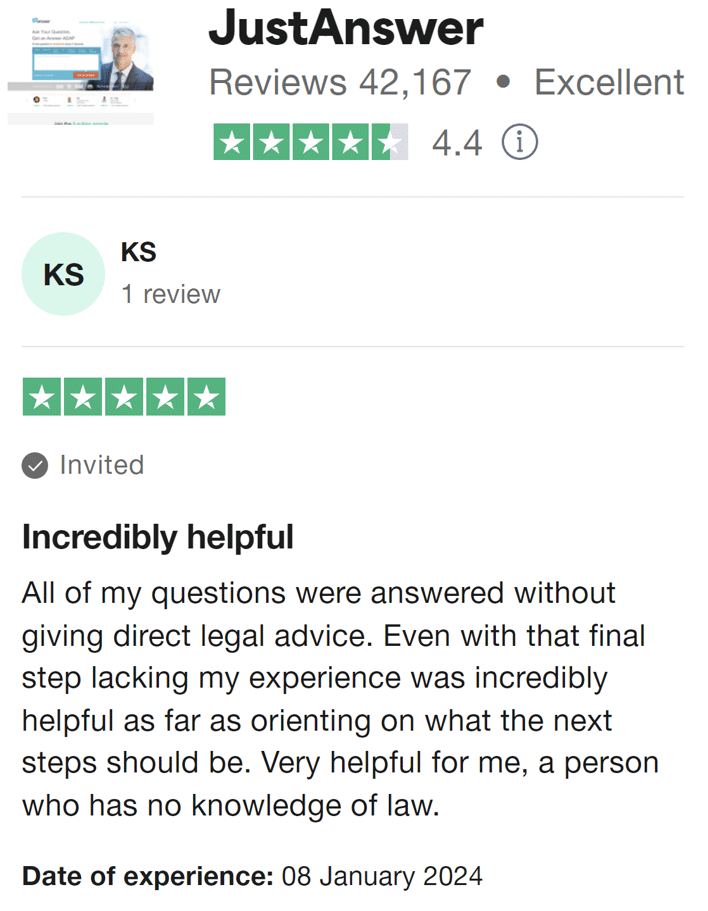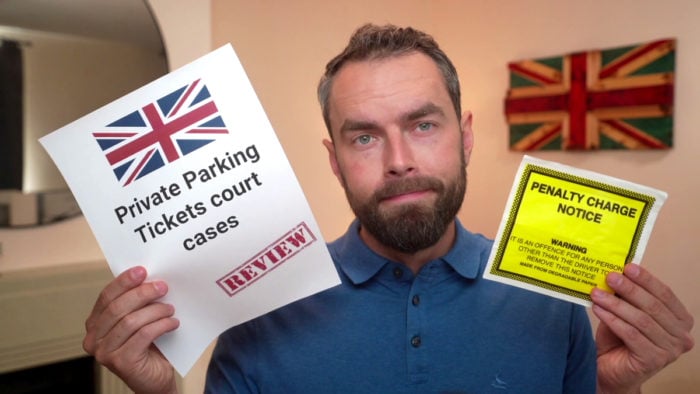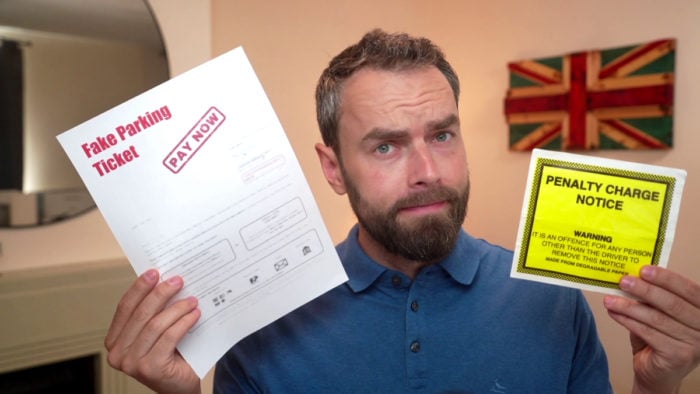DCBL Parking Fine – Should You Pay?
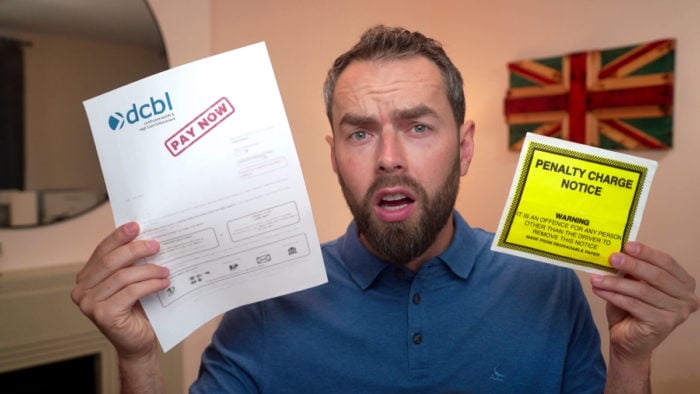
Have you got a DCBL parking fine and feel unsure about what to do next? You’ve come to the right place. Each month, over 130,000 people visit our website looking for guidance on fines and parking tickets.
In this article, we’ll explain in simple terms:
- What a DCBL parking fine is.
- If you need to pay DCBL parking fines.
- How you can appeal a DCBL parking fine.
- Ways to avoid getting a DCBL parking fine.
Unfortunately, parking tickets are very common, so you’re not alone. In fact, the DVLA report that over 11 million parking tickets were issued last year, which is up by 29% year on year!1.
We understand how you feel. That’s why we’re here to share our knowledge and help you through this. Let’s get started!
Most Ticket Appeals Succeed
In some circumstances, you might have a legitimate reason not to pay your parking fine.
It’s a bit sneaky, but the last time I needed legal advice, I paid £5 for a trial to chat with an online solicitor called JustAnswer.
Not only did I save £50 on solicitor fees, I also won my case and didn’t have to pay my £271 fine.
Chat below to get started with JustAnswer
*According to Martin Lewis, 56% of people who try to appeal their ticket are successful and get the charge overturned, so it’s well worth a try.
Should you pay the parking fine?
You’re not obligated to pay a private parking fine unless a judge tells you to do so. But being taken to court can add more expense to the matter 2.
Therefore, you should consider paying the DCBL parking fine if you have been contacted before court action.
You may still be able to appeal the parking ticket instead, which is an option if you don’t agree with the parking ticket.
This is quite common. In fact, POPLA is working hard to address issues that cause unfair parking fees. Main issues are often with technology and third party ticket issuers3.
However, keep in mind that you should pay the DCBL parking fine if you have already lost in court and have received a Notice of Enforcement.
You’re already legally obligated to pay, and not doing so will only result in more expense and stress.
Appeal Process Steps
If you believe the ticket was unfairly issued, you have the option to appeal. We’ve put together this quick table that explains the process. For more information, be sure to check out our complete guide.
| Process: | Steps you should take: |
|---|---|
| When you receive the ticket… | You should gather as much evidence as you can to support your appeal claim and prove that the ticket was unfairly issued. |
| If you were given the ticket in person/attached to your car… | You must make an informal appeal (sent to the local authority/council that issued the PCN) within 14 days. This should be a letter with the evidence proving why the ticket was incorrectly given. |
| If it was posted to you… | You will be given 21 days to submit an informal appeal (from the day you received the letter). Your informal appeal should be a letter with the evidence proving why the ticket was incorrectly given. |
| If the informal appeal is rejected… | You will receive a Notice to Owner and will have 28 days to respond to this with a formal appeal. You can conduct the formal appeal online or via paper form. The Traffic Penalty Tribunal can send you one of these forms. |
| If the formal appeal is rejected… | You will receive a Notice of Rejection. From here, you are free to challenge the council’s verdict at an independent tribunal. |
| If the independent tribunal disagrees with your appeal… | You should pay the ticket within 28 days of the tribunal rejecting your appeal. If you don’t, the fine will be increased by 50%. If you don’t have the money to pay the fine, you should contact Citizens Advice or another debt charity. |
Successful Appeal Case Study
Situation
| Initial Fine | £100 |
| Additional Fees | £171 |
| Total Fine | £271 |
The Appeal Process
Scott used JustAnswer, online legal service to enhance his appeal. The trial of this cost him just £5.
| Total Fine | £271 |
| Cost of legal advice | £5 |
JustAnswer helped Scott craft the best appeal possible and he was able to win his case.
Scott’s fine was cancelled and he only paid £5 for the legal help.
In partnership with Just Answer.
What happens if you don’t pay the charge?
The consequences of unpaid parking fines could lead to more stress and expense.
A number of scenarios could play out if you don’t pay a DCBL parking fine before any court action has taken place:
- You could be taken to court and eventually made to pay
- You could be continually contacted for payment, which can be stressful
- You could be left alone for a period and not have to pay – but then A and B could re-occur
The following will happen if you don’t pay a DCBL parking fine after receiving a court order telling you to pay and don’t:
- DCBL will send you a Notice of Enforcement giving you seven days to pay. The Notice of Enforcement adds a £75 fee to the debt, and you’ll also have to pay this.
- DCBL bailiffs will come to your property after seven days to request full payment and their own fees. At least another £235 is added to the debt at this stage. Or they will attempt to seize goods to be stored and sold (which incurs more bailiff fees!).
- DCBL may have to return to your property at a later date to recover assets, which adds even more fees to the debt. This will repeat until the debt has been cleared.
All the above are part of the parking fine enforcement process you may have to deal with.
Case study: Do not ignore Parking Charge Notices
We’ve included a message from a motorist who chose to ignore a Parking Charge Notice only to be contacted by DCBL.
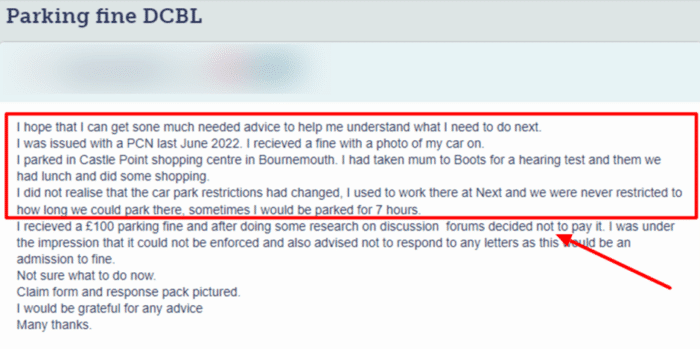
Source: Moneysavingexpert
Join thousands of others who got legal help for a £5 trial
Getting the support of a Solicitor can take a huge weight off your mind.
Reviews shown are for JustAnswer.
Can bailiffs force entry for parking fines?
Bailiffs can never force entry into a property unless they’re recovering assets as part of a Controlled Goods Agreement.
Even then, they must use a locksmith and not break into your home by kicking down doors. Bailiffs chasing parking fines will only access your home if you have left a door open or ajar.
For this reason, you may want to communicate with them through an upstairs window.
Can you appeal it instead?
Janine, our financial expert, advises to formally appeal a parking ticket within 28 days of receipt, providing evidence such as a photo of your car’s registration number if the PCN is incorrect.
However, if the private car park operator has already handed the debt collection process over to DCBL, it’s extremely likely that you’ve already run out of time to lodge an appeal.
But you may want to double-check this based on your own timeline.
Plus, make sure you follow the correct DCBL fine appeal process outlined above!
» TAKE ACTION NOW: Get legal support from JustAnswer
DCBL reviews
DCBL reviews online follow a familiar pattern.
Most of their clients are happy with the service because they’ve gotten their money back. Whereas those being chased are unhappy with how they’ve been treated.
Take a look at some examples below:
“We would certainly recommend this company and if the occasion arises we will use them again. A quick, painless and professional service provided. Case settled and remittance made promptly.”
- Anon (Trustpilot)
“Absolute scumbags… going after innocent vulnerable people over parking tickets they have paid for. Shame on you and your business clients.”
- Dave L (Trustpilot)
DCBL contact details
We’ve listed DCBL contact details in the table below
| Tel number: | 0203 434 0423 |
| dcbltd pay online: | https://dcbltd.com/make-a-payment-online/ |
| Complaints tel: | 0203 298 0201 |
| Complaints: | [email protected] |
Hire a Parking Solicitor for less than a coffee.
If you’re thinking about appealing your parking ticket then getting some professional advice is a good idea.
Getting the support of a Solicitor can make your appeal much more likely to win.
For a £5 trial, Solicitors from JustAnswer can look at your case and help you create an airtight appeal.
Try it below
In partnership with Just Answer.
